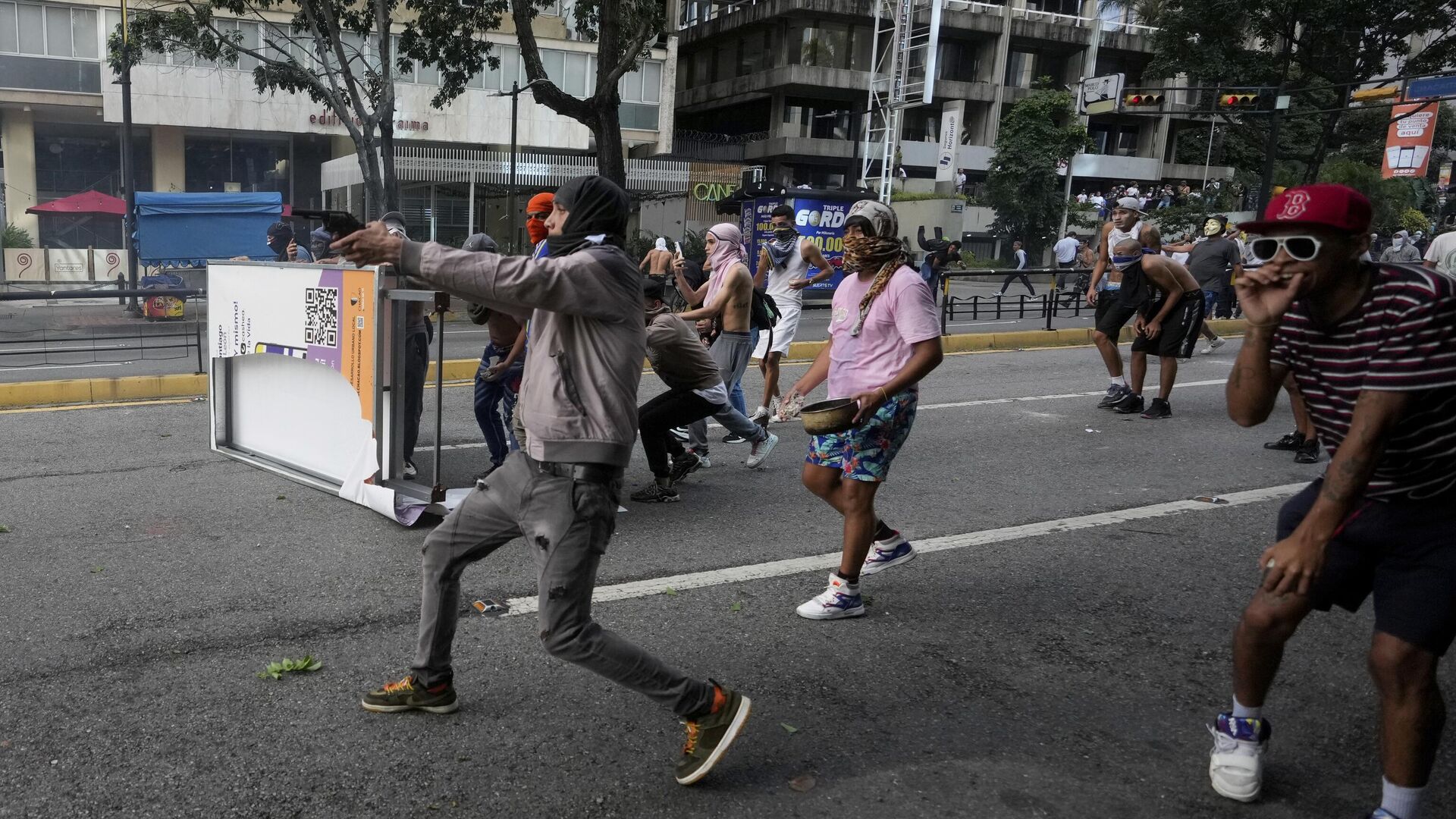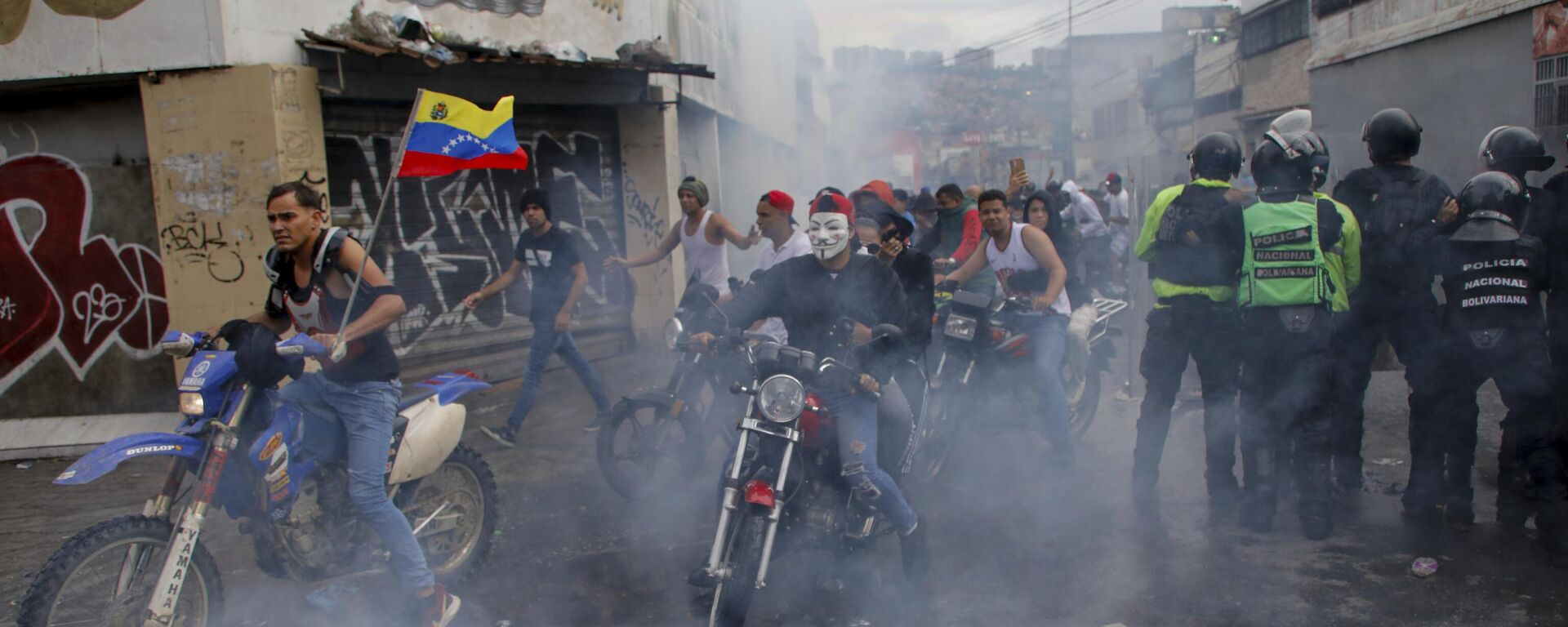https://sputnikglobe.com/20240730/protests-in-venezuela-definitely-financed-by-washington---russian-observer-1119560904.html
Protests in Venezuela Definitely Financed by Washington - Russian Observer
Protests in Venezuela Definitely Financed by Washington - Russian Observer
Sputnik International
The protest in Caracas after Sunday's elections are "definitely" funded by the United States, said a member of the delegation of Russian observers and lower house parliament member Alexey Volotskov told Sputnik.
2024-07-30T04:32+0000
2024-07-30T04:32+0000
2024-07-30T04:32+0000
americas
hugo chavez
nicolas maduro
venezuela
caracas
venezuelan
elections
https://cdn1.img.sputnikglobe.com/img/07e8/07/1e/1119560746_0:0:3072:1728_1920x0_80_0_0_b9efe126ff8c861507ffdcb2fddc2cef.jpg
"Of course, this is definitely funding from abroad, and such radical views of young, hooligan-minded people who may be looking for economic gain in this matter — to take some property, break something and steal, probably all this is multiplied," Volotskov said. Manifestations of extremism in Venezuela after the elections are a staged action and are not capable of influencing the electoral process, Volotskov added. On Sunday, presidential election was held in Venezuela, and the current head of state, Nicolas Maduro, won them. After that, protests began in Caracas on Monday with clashes between the police and protesters. The Venezuelan government said that a number of countries had interfered in the elections and in the people's right to self-determination.The leader of the opposition, Maria Corina Machado, who was barred from running in this election, has a long history with US-funded organizations. The Non-Governmental Organization (NGO) that she founded, Sumate, was funded by the United States through the National Endowment of Democracy.In the early to mid 2000s, there was a long on-again off-again trial for treason against Machado and three other leaders of the Sumate organization. According to diplomatic cables revealed by Wikileaks in 2011, the US government publicly and privately supported Sumate and pressured other countries to pressure Venezuela to drop the charges.A confidential cable dated June 14, 2005 described the effects of a meeting between Machado and then-US President George W. Bush, saying it gave then Venezuelan President Hugo Chavez's opponents a "much-needed moral boost.""It is important now to let the organization ride this surge largely on its own. A continuing, too evident, public identification with the U.S. could now be counterproductive. At the same time, however, we need to ensure that Sumate has the resources it needs to exploit this new vantage point it enjoys."
https://sputnikglobe.com/20240729/shots-heard-in-caracas-during-election-protests-1119558803.html
americas
venezuela
caracas
venezuelan
Sputnik International
feedback@sputniknews.com
+74956456601
MIA „Rossiya Segodnya“
2024
Sputnik International
feedback@sputniknews.com
+74956456601
MIA „Rossiya Segodnya“
News
en_EN
Sputnik International
feedback@sputniknews.com
+74956456601
MIA „Rossiya Segodnya“
Sputnik International
feedback@sputniknews.com
+74956456601
MIA „Rossiya Segodnya“
venezuelan election, us funding venezuelan opposition, were the elections in venezuela fair
venezuelan election, us funding venezuelan opposition, were the elections in venezuela fair
Protests in Venezuela Definitely Financed by Washington - Russian Observer
CARACAS (Sputnik) - The protests in Caracas after Sunday's presidential election are definitely financed by the United States, which has its own interests in Venezuela and sponsors the country's opposition, a member of the delegation of Russian observers, who is also the Russian parliament's lower house member, Alexey Volotskov, told Sputnik.
"Of course, this is definitely funding from abroad, and such radical views of young, hooligan-minded people who may be looking for economic gain in this matter — to take some property, break something and steal, probably all this is multiplied," Volotskov said.
"Today, from the windows of our hotel, we saw how protesters caught up with a policeman on a motorcycle, knocked him down, took the motorcycle, and rode away on it. This once again proves that there is also a property and economic component here, that is, people in these riots are trying to find some kind of economic use for themselves. Robbery and banditry, multiplied by support, slogans and financing — there is nothing to hide — of the American state, which has its own interests here and finances both the opposition and the riots that we are currently witnessing, being in Venezuela, in Caracas," the Russian lawmaker and observer added.
Manifestations of extremism in Venezuela after the elections are a staged action and are not capable of influencing the electoral process, Volotskov added.
On Sunday, presidential election was held in Venezuela, and the current head of state, Nicolas Maduro, won them. After that, protests began in Caracas on Monday with clashes between the police and protesters. The Venezuelan government said that a number of countries had interfered in the elections and in the people's right to self-determination.
The leader of the opposition, Maria Corina Machado, who was barred from running in this election, has a long history with US-funded organizations. The Non-Governmental Organization (NGO) that she founded, Sumate, was funded by the United States through the National Endowment of Democracy.
In the early to mid 2000s, there was a long on-again off-again trial for treason against Machado and three other leaders of the Sumate organization. According to diplomatic cables revealed by Wikileaks in 2011, the US government publicly and privately supported Sumate and
pressured other countries to pressure Venezuela to drop the charges.
A
confidential cable dated June 14, 2005 described the effects of a meeting between Machado and then-US President George W. Bush, saying it gave then Venezuelan President Hugo Chavez's opponents a
"much-needed moral boost.""Opponents of President Chavez greeted the May 31 meeting with high fives for poking Chavez in the eye, and momentarily put aside differences, reveling in having one of their own being received at such a high level," the cable read, adding that it did not want to appear too close to Sumate.
"It is important now to let the organization ride this surge largely on its own. A continuing, too evident, public identification with the U.S. could now be counterproductive. At the same time, however, we need to ensure that Sumate has the resources it needs to exploit this new vantage point it enjoys."




